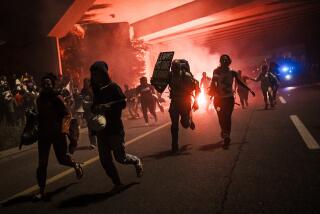Egypt rivals clash after Morsi is charged with espionage, murder
- Share via
CAIRO — Egypt’s political divisions seethed Friday as rival rallies between opponents and supporters of deposed President Mohamed Morsi resounded across the nation, and the military moved to weaken the resolve of Islamists after nearly a month of unrest.
The country’s volatile atmosphere — tanks clattered and riot police gathered — sharpened hours after state media reported that prosecutors had accused Morsi of espionage, murder and conspiring with the Palestinian militant group Hamas. The allegations infuriated Morsi’s Islamist supporters, who cursed the military and chanted, “God is great.”
Protesters surged into Cairo’s Tahrir Square to support the coup that overthrew Morsi on July 3 and an anticipated crackdown against his backers, including his political party linked to the Muslim Brotherhood movement. The army’s call for harsher measures could tilt the nation toward civil war or force Islamists into a political reconciliation with the new government.
Fireworks exploded overhead and army helicopters buzzed city skylines. Police fired tear gas to disperse scuffles in the coastal city of Alexandria, where authorities said six people were killed. Skirmishes also broke out in Cairo, where Egyptian media reported 10 pro-Morsi supporters were killed when police fired on a demonstration early Saturday. The Health Ministry said 71 people were injured nationwide.
The country’s conflicting passions have been punctuated by street fighting and defined by dueling images: Islamists holding posters of Morsi and his opponents waving banners of Gen. Abdel Fattah Sisi, commander of the armed forces, who has risen as a hero to millions of Egyptians demanding stability and an end to economic turmoil.
“We back all of Sisi’s decisions. Morsi should have left office quietly and with dignity,” said Eman Abdelhamid, a former nurse standing in Tahrir. “But the Brotherhood’s greed, lack of understanding and the deals they made with the outside world to destroy our country have unfortunately led us here.”
Another protester in Tahrir, Adel Mohamed, said marchers would head across the city to the Rabaa al Adawiya mosque, where pro-Morsi demonstrators have been camped for weeks.
“Today is the last day for the Muslim Brotherhood in Rabaa,” Mohamed said. “There is a plan to surround their sit-in, and neighbors in the buildings around them will stand on their balconies and ask them to leave.... I’m certainly expecting violence.”
Sisi’s vow this week to crush what he called “terrorism and violence” set the mood for a showdown. Even the police, once the reviled symbol of an oppressive state, were seen by many Egyptians as partners with the army against the Muslim Brotherhood and ultraconservative Islamists. Military helicopters, in a bit of psychological warfare, dropped leaflets on Brotherhood supporters at Rabaa al Adawiya.
“Everything the armed forces do is for you,” the leaflets read, addressing citizens, “and holds no resentment for religion or humanity or any threat to life or freedom. So join us hand in hand. We are not your enemies and you are not ours, we support you so you may support your country and not raise your weapon against your brother.”
But pro-Morsi supporters were defiant. They prayed and chanted, vowing they would not end their sit-in until the deposed president was returned to office. They spoke of peace but shook with rage.
“I am here hoping that God would bless me with martyrdom. We are not leaving until we succeed and our demands are met,” said Salah Omar, standing near the Rabaa mosque. “Sisi’s last speech inflamed everyone. He wants blood; he wants to see Egyptians clash as he observes from afar only to then intervene and claim himself the savior of the people.”
As protesters on both sides massed, Egypt’s official news agency reported Morsi would be held for 15 days while prosecutors investigate charges that in 2011 he conspired with Hamas, the Palestinian radical group that controls the Gaza Strip, to attack police stations and jails, “setting fire to one prison and enabling inmates to flee, including himself, as well as premeditated killing of officers, soldiers and prisoners.”
The charges stem from an escape by Morsi and other political prisoners, including other members of the Brotherhood, during the uprising that toppled President Hosni Mubarak in February 2011. The accusations have been discussed in judiciary circles for months. They have gained traction as the army seeks to impose order, marginalize the Brotherhood and move beyond more than two years of political division.
Morsi had said in an earlier television interview that unknown men had freed him and other Brotherhood members from Wadi Natrun prison. The criminal charges are widely seen as politically motivated. But they appear to give the army a legal basis to detain Morsi amid growing international criticism that he has been held incommunicado for nearly one month.
“At the end of the day we know all of these charges are nothing more than the fantasy of a few army generals and a military dictatorship,” Brotherhood spokesman Gehad Haddad told reporters. “We are continuing our protests in the streets.”
Saber Mohamed Hassan, a carpenter, stood with thousands outside the mosque, listening to preachers and vilifying the army.
“Sisi is either going to surrender or is insane with power enough to continue in his call for a civil war,” he said. “He might try to disperse the sit-in, but we have a million martyrs ready.”
Hassieb is a special correspondent. Special correspondent Manar Mohsen contributed to this report.
More to Read
Sign up for Essential California
The most important California stories and recommendations in your inbox every morning.
You may occasionally receive promotional content from the Los Angeles Times.











